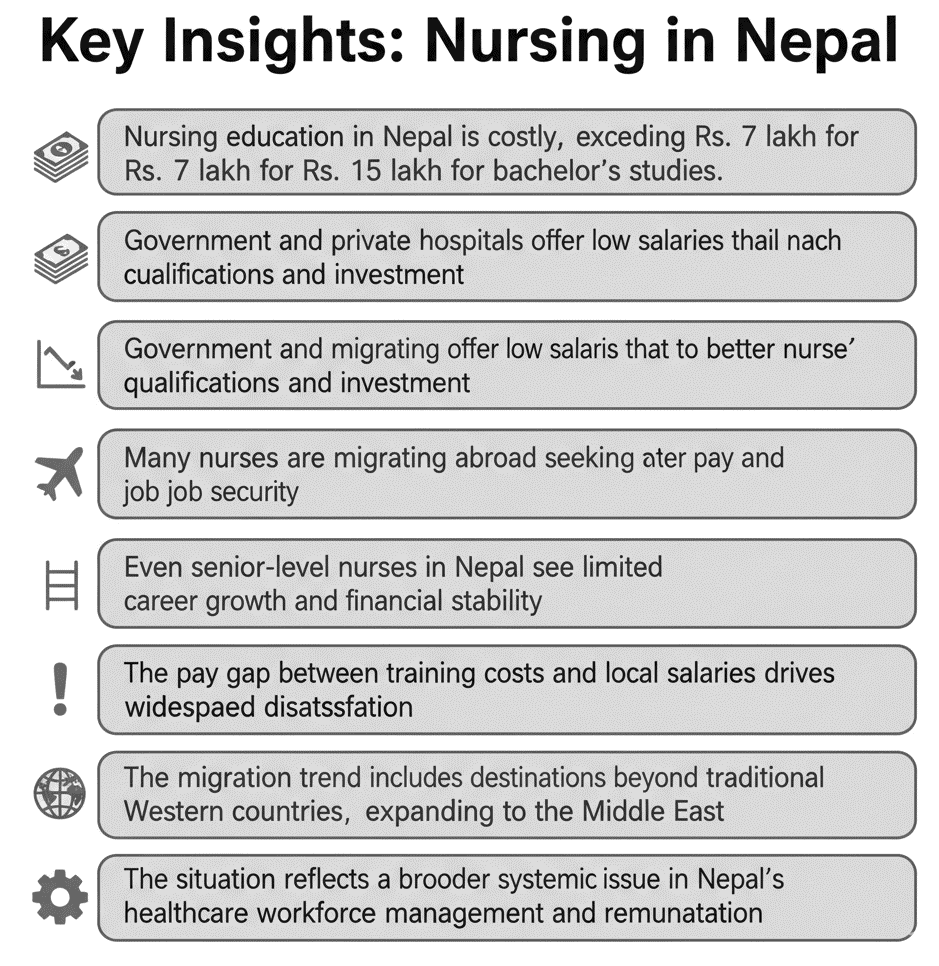
Nurses Forced Abroad Due to Low Pay in Nepal
Many nurses in Nepal are compelled to seek employment abroad because their earnings do not reflect the cost and value of their work. Studying nursing is expensive — over seven lakh rupees for the Proficiency Certificate Level (PCL Nursing) and more than fifteen lakh rupees for a bachelor’s degree. Yet, both government and private hospitals continue to offer extremely low pay, pushing nurses to migrate in large numbers.
A senior nursing professional from a government hospital in the Kathmandu Valley shared that despite holding a high-level position with a seventh-grade salary, she decided to move abroad after losing confidence in her career prospects in Nepal. Her case represents thousands of Nepali nurses who are leaving the country in search of better opportunities and fair compensation.
Growing Nurse Migration
The minimum salary for nurses in government hospitals is Rs. 34,730 per month. Dissatisfied with this rate, thousands of nurses from both public and private hospitals are migrating abroad. The outflow is no longer limited to destinations like the United States, Australia, Canada, or Europe — countries in the Middle East, including Kuwait, Saudi Arabia, and Dubai, have also become common choices.
According to the Nepal Nursing Council, over one thousand nurses leave the country every year. This figure excludes those who travel abroad without registering with the council or those who go overseas for further studies and decide to stay there. As of the end of Ashar 2082, the council reports that 50,776 nurses have received a No Objection Certificate (NOC) to work abroad.
Government Directive on Equal Pay
The Ministry of Health and Population (MoHP) has directed private hospitals and medical colleges to provide salaries equivalent to those in government institutions. However, these directives remain largely unimplemented.
Recently, many nurses from private hospitals and medical colleges have launched protests demanding fair pay. Following these demonstrations, the ministry instructed private institutions to ensure government-level remuneration and allowances for nurses.
Reports show that some private hospitals pay as little as Rs. 11,000 per month, far below the government’s minimum of Rs. 34,730. On Mangsir 27, 2081, the MoHP issued a five-point directive to all medical colleges, hospitals, and health science institutes — including government, community, and private institutions — requiring them to implement this pay scale and report compliance to the ministry. However, implementation remains incomplete, prompting the ministry to issue a reminder for immediate action.
Nurses Demand Fair Compensation
Chandrakala Sharma, President of the Nepal Nursing Association, stated that nurses’ salaries remain extremely low despite their crucial role in the healthcare system. She revealed that nurses at Manipal Medical College and Gandaki Medical College were being paid unfairly, prompting the association to submit a memorandum to the government.
The ministry has clarified that hospitals must issue experience certificates to nurses and ensure that all payments are made through the banking system. It also warned that legal action will be taken against hospitals or institutions that fail to comply with these regulations.
Private Colleges Claim Inability to Match Government Pay
Meanwhile, the Nepal Private Medical and Dental College Association has informed the Ministry of Health and Population that private institutions cannot afford to pay government-level salaries to nurses.
Association Chairperson Prof. Dr. Gyanendra Man Singh Karki stated that matching government pay scales is not financially feasible for private colleges. He added that salaries could be raised to Rs. 40,000 only if nurses commit to staying for at least five years. He further argued that if the government demands full parity in benefits, then private medical colleges should be nationalized.
Government Calls All-Party Discussion
Following Prime Minister Sushila Karki’s directive to address nurses’ grievances, the Ministry of Health and Population initiated a multi-party discussion to find a solution. On Friday, the ministry held talks involving representatives of protesting nurses, the Nepal Nursing Association, the Private Medical and Dental College Association, the Ministry of Education’s Medical Education Commission, and other stakeholders.
To reach a more conclusive outcome, an all-party discussion has been scheduled for Sunday. According to the association’s president, Prof. Chandrakala Sharma, the discussions focused on the nurses’ demands, existing challenges, and necessary improvements in working conditions.
Health Secretary Dr. Bikash Devkota said that Friday’s discussion was moving in a positive direction and assured that the government remains committed to resolving the issues raised by the protesting nurses.



